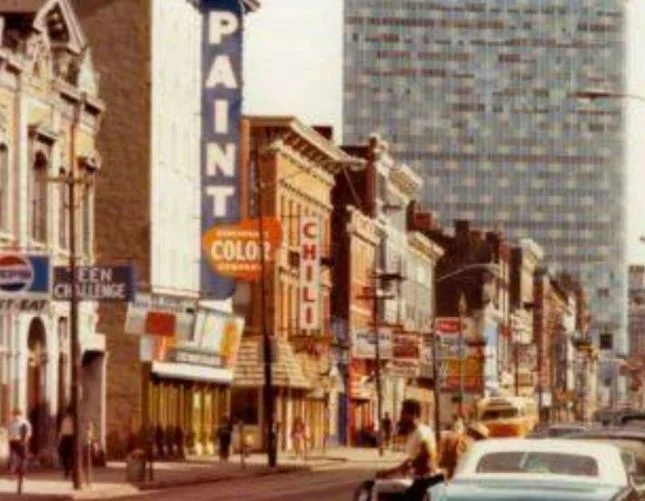The Over-the-Rhine Museum is delighted to announce the next installment in our lecture series, “Three Acts in Over-the-Rhine” on Thursday, September 12, at First Lutheran Church, 1280 Race Street in Over-the-Rhine. Doors will open at 6 pm and the program will begin at 6:30 pm.
The latest set of talks in our Three Acts series will offer a diverse set of topics with something for everyone. We will start off with a talk about connections between Over-the-Rhine and the West End, using the Revelation Baptist Church building as an example, then learn about Over-the-Rhine's longest operating chili parlor, and finally explore detailed plans for Over-the-Rhine created in the 1970s but never implemented.
Anne Delano Steinert, Dann Woellert, and Rob Gioielli will speak at this September 12 program.
Click here to reserve tickets.
Anne Delano Steinert
Anne Delano Steinert is a PhD candidate in urban history at the University of Cincinnati where her work focuses on the history of the built environment with a focus on Cincinnati's basin neighborhoods. She recently curated the award-winning exhibit Finding Kenyon Barr: Exploring Photographs of Cincinnati's Lost Lower West End (2017-2018) and Look Here! (2016) which featured historic photographs of Over-the-Rhine on street poles throughout the neighborhood. She was the founding board chair of the Over-the-Rhine Museum and says her hardest job of all is being a mom to 9 year old Seneca.
Steinert's talk will use a former synagogue building on John Street, now home to Revelation Baptist Church, to consider often-forgotten connections between Over-the-Rhine and the neighboring West End. Though these two neighborhoods look very different today, they once had much more in common than we might recognize. By exploring the history of the three congregations which have called the building at 1554 John Street home, Steinert will consider Over-the-Rhine's place in Cincinnati's larger urban basin. The Revelation Baptist Church building was built in 1864 and is the second oldest remaining synagogue building in Cincinnati. It was later used as a German Lutheran church and is now home to a Baptist congregation. The first two of these congregations both moved to John Street from Over-the-Rhine.
Dann Woellert
Dann Woellert travels the region in search of weird food, about which he loves to write, speak and demonstrate. He’s discovered forgotten Germanic cheese dips once prolific on the West Side, long forgotten indie chili parlors, and now has taken on the daunting mission to make goetta more well known than scrapple in the U.S. He has written four books about Cincinnati’s weird regional foods, spoken to many local historical societies, and curates the blog “Dann Woellert the Food Etymologist.” The way to his heart is through Green Tea Kit Kats and a good cinghiale con cioccolato.
Although there are no chili parlors today in Over-the-Rhine, Woellert will talk about the historic chili parlors that used to dot the landscape. They included owners that spanned the diversity of residents of Over-the-Rhine including those of Germanic, Greek, and Appalachian ancestry. Like chili parlors in other neighborhoods, those he will talk about are tied to the original Empress Chili, and locations near the various theatres in the neighborhood. The longest running chili parlor, Little Mexico, has an interesting story and is still remembered by many today who grew up in the neighborhood from the 1960s to the 1980s. Others like Manhattan Chili, Liberty and Main Chili, Mohawk Chili and Crystal Chili, although mostly out of current memory, certainly contributed to Cincinnati Chili culture.
Rob Gioielli
Rob Gioielli is an environmental historian, broadly interested in the intersections of race and inequality in the urban environment, as well as the critical history of environmental activism and politics. A lifelong Cincinnatian, he is currently an associate professor of history at the University of Cincinnati Blue Ash College, where he also directs the college's honors program. This talk emerges from his current research, which examines how race and changing ideas of the "inner city" in the 1970s have shaped fossil fuel use and the greater challenges to sustainability in the American metropolis.
Gioielli’s talk will focus on how in the early 1970s the City of Cincinnati hired Harris Forusz, a planning professor at the University of Cincinnati, to develop a long-term master plan for Over-the-Rhine. Forusz was a firm believer in citizen activism, and empowering local and community residents, but the plan was developed under the auspices of Model Cities, a billion dollar federal program designed to solve the problems of urban poverty through citizen activism and infrastructure spending. The final product of his work, the 1975 plan for Over-the-Rhine, is a fascinating snapshot into a lost moment in community planning and national urban policy, the last real moment when both regular Americans and political elites believed the federal government could, and should, empower local communities.
Doors will open at 6:00 PM for appetizers before the event, with speakers starting at 6:30 PM. The Museum suggests a $5 donation for this evening of provocative stories.
Three Acts in Over-the-Rhine is an innovative series designed to expose attendees to stories of the Over- the-Rhine neighborhood. Each event features three fifteen-minute talks on the history of Over-the-Rhine. All three presenters answer questions together about their presentations. For advance tickets please visit:
Eventbrite link: https://www.eventbrite.com/e/three-acts-in-over-the-rhine-churches-chili-and-change-tickets-71601230207
Facebook link: https://www.facebook.com/events/2284973351815829/
____
The Over-the-Rhine Museum inspires understanding and respect for the people who have created and lived in Cincinnati’s historic Over-the-Rhine neighborhood by working with visitors and community members to uncover, present, and preserve their stories in an immersive experience.

